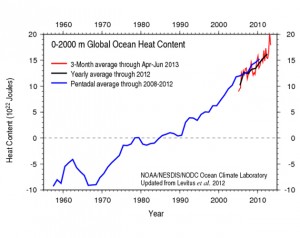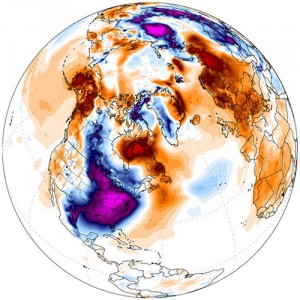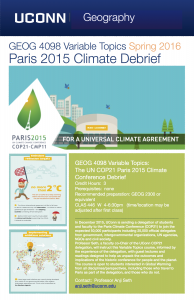[As seen on UConn Today: http://today.uconn.edu/blog/2014/01/global-warming-the-conversation-we-need-to-have/ -AS]
We all know the earth’s climate is changing. The effects are inescapable no matter where we live. Here in New England, some changes are subtle (more humidity, consistently warmer nights), dramatic (more intense rainfall events), confusing (bigger snowfall events), and dangerous (more powerful hurricanes). The science tells us these are expected in a warming world, and indeed, we see them.

Change in heat content in the upper 2000 m of the world’s oceans. (Source: NOAA) >>
We also know that we are in the driver’s seat for these changes. Our burning of oil, coal, and natural gas – fuels that have been extracted from fossil reserves buried in Earth’s crust – is changing the composition of the atmosphere. Greenhouse gases constitute a tiny fraction of the atmosphere, but their ability to trap heat has made the difference between Earth being a frozen ice-ball of a planet and the relatively balmy one we inhabit. Greenhouse gases do this by preventing heat from escaping to space, just as a blanket tucked around a child at night keeps her warm. We are adding to this greenhouse gas blanket, and earth is warming up.

^^ September Arctic sea ice extent data since 1980 from the National Snow and Ice Data Center. (Image by Dana Nuccitelli, Skeptical Science, http://www.skepticalscience.com/graphics.php?g=64)
The most comprehensive accounting of the evidence can be found in the Intergovernmental Panel on Climate Change (IPCC) Assessments. The IPCC has begun to release the 5th Assessment Report and the latest installment has increased the certainty to 95 percent probability that humans are driving the observed and projected changes. The consensus of climate scientists from around the world is that the link between human actions and climate change is as strong as the link between smoking and cancer.
Still we hear in the media reports that global warming has stopped for the last 15 years; that increases in polar ice this year run contrary to the theory; and that an extreme cold snap puts a nail in its coffin.
Do these observations blow a hole into the theory of global warming? Not at all. Here’s why:
- First, the scientific evidence that supports greenhouse warming is vast, and has been building for more than 170 years. The climate system is noisy, and earth’s temperature will vary around the long-term trend. During any given 10-15 year period, the warming of the atmosphere may accelerate or decelerate but, in the longer term, temperatures are increasing and will continue to do so. You would not choose 15 data points when you had 170 to characterize a trend. A subset of years without a significant trend do not change the basic physics – that excess heat is held in the climate system by increasing greenhouse gas concentrations.
- Second, in the past decade or so, more of the excess heat trapped by greenhouse gasses appears to be going into the deep oceans, which is why globally averaged warming has slowed. Note that over land, temperature increases have continued at a clip and global average temperatures remain at a record high, with the last 10 years qualifying as the warmest decade in the historical record.
- Third, Arctic sea ice continues to be substantially below the long-term average in both areal extent and thickness. This past year, the Arctic sea ice was 6th lowest and more than a million square kilometers below the average area from the period 1981 to 2000. This past year’s ice area is certainly higher than 2012’s – but only because sea ice in 2012 was the lowest ever on record. In this case again, a comparison between two years does not tell the whole story. Climate is the story told over many decades.

<< Temperature differences from average for Jan. 7, 2014, where red is warmer, blue colder than average. (Data/image obtained using Climate Reanalyzer (http://cci-reanalyzer.org), Climate Change Institute, University of Maine, Orono)
The cold spell earlier this month, while breaking records, must be seen in the larger space and time context of the climate. In recent weeks, while the central and eastern U.S. became the playground of the polar vortex and its extreme cold, the rest of the northern hemisphere, including the polar region, experienced warmer than normal temperatures. Daily weather statistics continue to show that the number of record warm temperatures is far exceeding the number of record cold temperatures.
Let us not be distracted by those who misuse data in order to create doubt about global warming. Their purpose is to delay the important conversation. Let us instead turn the conversation to: What can be done to mitigate the worst-case scenarios and to prepare for the unavoidable ones? What is already being done? What do we collectively need to do?
On these pressing questions there are many constructive arguments to be made. At UConn, we are having lively conversations that have resulted in action plans to (1) reduce CO2 emissions and (2) adapt infrastructure and systems across campus. Let’s focus on actions, not distractions. Let’s get to the right conversation.
 is to make the voices of vulnerable countries to climate change heard and will be one of action.
is to make the voices of vulnerable countries to climate change heard and will be one of action.





